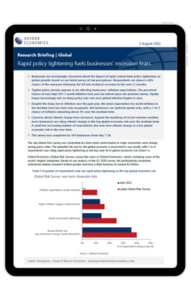Rapid policy tightening fuels businesses’ recession fears

The July Global Risk Survey was conducted at a time when central banks in major economies were sharply raising policy rates. The potential fall-out for the global economy is prominent in our results, with 1-in-4 respondents now citing rapid policy tightening as the top near-term global economic risk.
What you will learn:
- Businesses are increasingly concerned about the impact of rapid central bank policy tightening on global growth, based on our latest survey of risk perceptions. Respondents see almost a 60% chance of the eurozone following the US into technical recession in the next 12 months.
- Tighter policy already appears to beaffecting businesses’ inflation expectations. The perceived chance of very high (6%+) world inflation next year has halved since our previous survey.
- Despite the sharp rise in inflation over the past year, the mean expectation for world inflation in the medium term has risen only marginally. But businesses see material upside risks, with a 1-in-5 chance of inflation remaining above 4% over the medium term.
Tags:
Related posts

Post
Global Key themes 2026: Bullish on US despite AI bubble fears
We anticipate another year of broadly steady and unexceptional global GDP growth, but with some more interesting stories running below the surface.
Find Out More
Post
Industry key themes 2026: Industry will grow if you know where to look
Prospects appear solid for global industry in 2026, but activity is set to remain regionally and sectorally divergent.
Find Out More
Post
Real Estate Key Themes 2026: CRE deal recovery delayed, not derailed
Real estate is still poised for a revival in 2026. Although 2025’s deal recovery was delayed, the key fundamentals remain in place for renewed momentum.
Find Out More